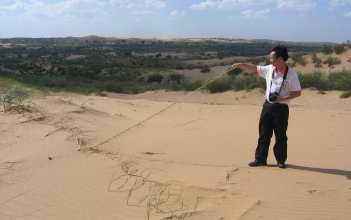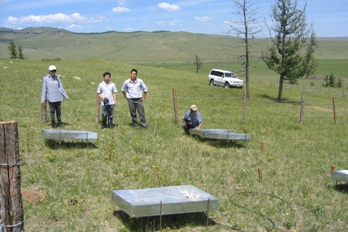



The Systems Ecology Group is involved in several projects in China.
One project studies the role of plant traits in reducing soil erosion in dry ecosystems, e.g. through organic matter accumulation (and associated water retention), sand capture and microclimate amelioration.
Coordinated by the Institute of Botany of the Chinese Academy of Sciences (IB-CAS), Beijing, this involves a network of field manipulation experiments (VEWALNE) that mimic future precipitation and nitrogen deposition regimes in steppe vegetation in China and Mongolia.
Secondly, with IB-CAS and colleagues at SW China University (Chongqing) and Xishuangbanna Tropical Botanical Garden (CAS, Yunnan) there is long-term collaborative research on the links between plant traits and carbon and nutrient cycling in contrasting Chinese ecosystems.
In the subtropical monsoon region of Chongqing (where Hans Cornelissen holds an honorary Chair at SW China University), in the Red Basin, this work has strong links to soil erosion, both in relation to the prevailing intensive agricultural land use and to impacts of the belt of extreme seasonal water fluctuation in the Yangtze River upstream of the recently built, giant Three Gorges Dam. In Xishuangbanna (in tropical S China), one of the foci of research is carbon and nutrient cycling related to various species and functional types of bamboo grown for human use throughout southern China, often on erosion-sensitive slopes (work coordinated by Hans Cornelissen in cooperation with Professors Ming Dong, Jianping Tao, Guofang Liu, Bo Zeng, Kunfang Cao and others).
The feasibility to restore degraded mangrove forests is investigated in South Java, Indonesia. Restoration is hampered by profound changes in vegetation-soil dwelling fauna interactions, where predation on propagules and seedlings of mangrove species is a major constraint.
Two closely linked PhD projects study the above interactions and carry out field trials aiming to limit predation damage.
The critical importance of vegetation functioning to soil carbon and hydrological cycling is central to several other (non-tropical) projects. Plant traits-based modelling approaches are applied to quantify feedbacks with soil organic matter dynamics, soil microbial functioning and soil physical characteristics.
The subsequent impact of those feedbacks on ecosystem functioning and resilience are determined at multiple spatial scales. Insights obtained are applied to improve global earth system models as well as to provide advice to those involved in nature management and ecosystem restoration (work coordinated by Peter van Bodegom).
In collaboration with CATIE, Costa Rica, a traits data-base of trees applied in agroforestry systems is being developed.
The data-base will be used to optimise the tree configuration in agroforestry systems based on multi-criteria analysis (VUA-SE contact: Peter van Bodegom).